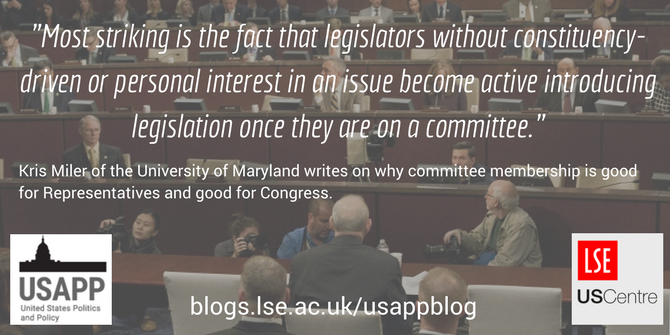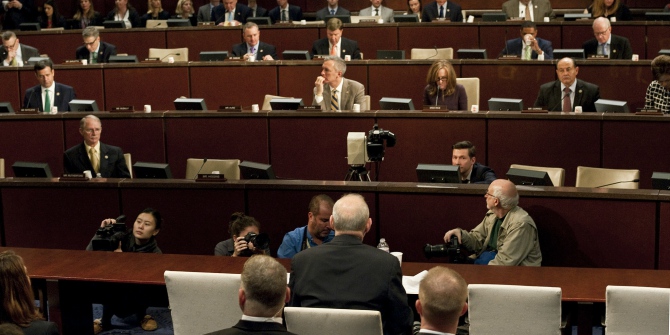 The US House of Representatives has more than 20 committees which divide up lawmaking and encourage lawmakers to specialize. Committee members are also more likely to promote legislation in their committee’s areas. Kristina Miler finds that specialization promotes legislating; committees are successful in compelling even otherwise uninterested legislators to be more active. In light of these findings, she argues that delegating power to committees is beneficial to Congress and that efforts to elevate the importance of committees should be welcomed.
The US House of Representatives has more than 20 committees which divide up lawmaking and encourage lawmakers to specialize. Committee members are also more likely to promote legislation in their committee’s areas. Kristina Miler finds that specialization promotes legislating; committees are successful in compelling even otherwise uninterested legislators to be more active. In light of these findings, she argues that delegating power to committees is beneficial to Congress and that efforts to elevate the importance of committees should be welcomed.
Committees are integral to how the US Congress works, as a way to divide the immense task of lawmaking and foster specialization by policy area. For instance, in today’s House of Representative, there are more than twenty committees devoted to areas such as Education and the Workforce, Small Business, and Homeland Security. Political scientists have shown that committee members are far more active in legislating on issues that relate to their committees as compared to non-committee members. Less clear is why this is the case. Is it because committee members are inherently more interested in those issues, or does their position on the committee provide unique information and advantages?
I answer this long-standing question by looking at novel data on the committee requests and actual committee assignments of incoming House members. Overall, I find that position trumps interests. The behavior of committee members who requested their seats is largely indistinguishable from the behavior of committee members who did not, albeit with two interesting caveats. First, it takes some time for the institutional position of being on a committee to affect legislators’ behavior. Second, those who expressed interest in the issue by requesting the committee end up being more successful in passing legislation.
Upon election to the House, legislators request the committees on which they would like to serve. Party leaders then make the committee assignments based on these requests as well as factors like the available seats, norms of regional balance, and legislators’ electoral security. A common assumption is that all committee members wanted to be on the committee(s) on which they serve. But this is not true. Looking at incoming legislators who joined the US House of Representatives, I first show that fully one-third of freshmen are assigned to committees that they did not request.
This variation creates an opportunity to examine competing arguments for why committee members are more active on policy than other House members. One argument is that committee members have a particular interest in a policy area that leads them to be on the relevant committee – and then also to sponsor more legislation in those areas. From this perspective, committees sort legislators according to pre-existing interests, which raises concerns that committees are composed of outliers and are not representative of the full House. A second argument is that the institutional design of the committee system promotes heightened individual activity by providing committees with additional staff and resources, as well as with procedural prerogatives in the policymaking process, such as conducting hearings. According to this perspective, then, committee members are uniquely active because their position reduces the cost of participating.
To arbitrate between these two perspectives, I follow the careers of four cohorts of members of the US House of Representatives over their first four terms in office (1987-2000). I compare their committee requests, which are drawn from scholars’ archival research with their official committee assignments to identify which legislators requested their committee seat and which did not. I then examine whether requesting one’s seat increases the number of relevant bills a committee member sponsors, while holding aside any possible effects of being in the majority party or previous professional experience in the policy area.

“House Committee on Homeland Security Hearing” by U.S. Department of Homeland Security (DHS) is US Government work
My analyses reveal no significant difference in the actions of committee members who asked to serve on a committee and those who did not; committees are successful in compelling even otherwise uninterested legislators to be active. Committee members, whether they wanted to be on the committee or not, sponsor much more legislation in the issue area than non-committee members. In fact, they are twice as active as legislators who expressed interest in the policy area but are not on the committee.
The advantages that come with serving on a committee, however, do not accrue to members overnight. During their first term in the House, legislators’ interest in a policy area actually plays a larger role. Committee members who expressed their interest in a policy area, such as agriculture or transportation, initially sponsor more bills on those issues than committee members who did not request their seat. But after the first term, the reluctant committee members catch up to them – as discussed above – and committee members cannot be distinguished from one another.
Legislators’ interests also matter in one other way – when it comes to ushering legislation through the congressional process. Bills by committee members who requested their seat are more likely to pass the House than bills introduced by their colleagues who did not ask to be on the committee. This pattern suggests that legislators with greater personal interest in the policy are more likely to make the commitment necessary to guide a bill through the long legislative process to successful passage in the House.
Committees are good for Representatives – and for Congress
What does this all mean? Three major implications emerge from this examination of committee requests and committee assignments. First, congressional committees are effective in fostering the division of labor and development of policy expertise among legislators, regardless of legislators’ interest in the issue area. Most striking is the fact that legislators without constituency-driven or personal interest in an issue become active introducing legislation once they are on a committee.
Second, this result reduces concerns about committees as pockets of policy outliers wherein legislators with preexisting interest in the policy area select onto the committee and render committees unrepresentative of the full House. In fact, my findings suggest that assigning legislators to committees that they did not request can reduce the potential bias of self-selection while maintaining the benefits of specialization.
Third, this research suggests that delegating power to committees is beneficial to Congress and that efforts to elevate the importance of committees should be welcomed. Committees have become less powerful in today’s highly partisan Congress, which produces a congressional agenda more dominated by individual and partisan interests and less informed by collective expertise. For many years, the committee system in the House was successful in promoting issue-based expertise in the legislative process, and the potential is there for it to serve this function again in the future.
- This article is based on the paper, ‘How Committees Shape Legislative Behavior: An Examination of Interests and Institutions’ in American Politics Research.
Please read our comments policy before commenting.
Note: This article gives the views of the authors, and not the position of USAPP– American Politics and Policy, nor of the London School of Economics.
Shortened URL for this post: http://bit.ly/2j6r1Fh
_________________________________
About the author
 Kris Miler – University of Maryland
Kris Miler – University of Maryland
Kris Miler is an Assistant Professor in the Department of Government and Politics at the University of Maryland. Her research interests focus on political representation, especially in the US Congress. She is the author of Constituency Representation in Congress: The View from Capitol Hill (Cambridge University Press, 2010), which won the Alan Rosenthal Award from the American Political Science Association for the best book or article of potential value to legislative practitioners. Her research has appeared in the Journal of Politics, Legislative Studies Quarterly, Political Psychology, and American Politics Research. She is also the author of Poor Representation: Congress and the Politics of Poverty in the U.S., which is forthcoming from Cambridge University Press.




